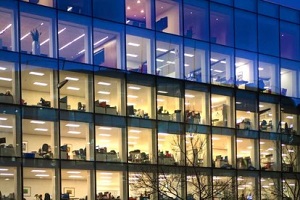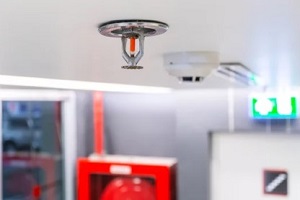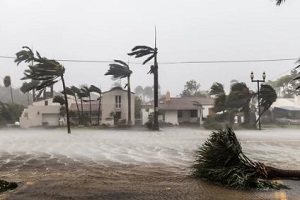 Commercial property insurance provides businesses with protection against a broad range of risks. Although it can quickly prove its value when a claim is filed, businesses may find it useful to know how insurance companies calculate their premium. Learn more about the factors that influence the cost of commercial property insurance with this guide:
Commercial property insurance provides businesses with protection against a broad range of risks. Although it can quickly prove its value when a claim is filed, businesses may find it useful to know how insurance companies calculate their premium. Learn more about the factors that influence the cost of commercial property insurance with this guide:
COPE Data
The acronym COPE is used to summarize the categories of property information that a typical commercial property insurance application collects.
These are:
- Construction
- Occupancy
- Protection
- Exposure
These details are used by underwriters to comprehensively understand risk and its potential exposures. Understanding these factors can help businesses be prepared for their insurance quotes and find ways to reduce their premiums.
Construction
This category consists of data related to the building’s construction materials, size and age. This tells underwriters whether the building was constructed using materials that are fire-resistant, non-combustible or flammable as well as the durability of the building.
For example, buildings with wood frames are considered highly combustible, whereas buildings made entirely of non-combustible materials, such as stone, steel, concrete, or masonry, will have lower property insurance rates.
 Larger buildings tend to pay more for commercial property insurance. However, there are a few exceptions to this general rule. For example, a big warehouse space may have a lower square-foot premium cost than a high-end office of the same size that is constructed with the same building materials but filled with high-tech equipment.
Larger buildings tend to pay more for commercial property insurance. However, there are a few exceptions to this general rule. For example, a big warehouse space may have a lower square-foot premium cost than a high-end office of the same size that is constructed with the same building materials but filled with high-tech equipment.
Older buildings can also see higher premiums, particularly if they have not been updated recently. Older buildings that have not been upgraded have a higher potential for loss, such as water damage, electrical fire, and more.
These buildings tend to have older wiring and plumbing. If something goes wrong, the costs of repair or replacement could be significantly higher than they would be on a newer building.
Another consideration is local codes. In the event of a loss, local building departments may require businesses to rebuild according to code, and this can be very expensive for older buildings without protection from ordinance or law coverage.
Occupancy
The occupancy category relates to the type of operations that take place inside the building and how hazards are being managed.
For example, office buildings that are occupied by professions such as lawyers and accountants are generally considered to have a low risk because people tend to sit behind desks or in meeting rooms working on computers or paperwork. This means there is very little operational risk.
In contrast, manufacturing operations and car repair shops have a far greater operational exposure. Manufacturing operations use heavy machinery, while businesses such as car repair shops regularly use flammable chemicals and paints. Therefore, these businesses cost more to insure.
Protection
 Protection data refers to the building’s internal and external features that could help mitigate common property losses such as fire and water-related damage. For example, buildings that are equipped with sprinkler systems, fire alarms, fire extinguishers and water leak monitoring systems may be able to save money on their insurance premium. Security measures such as burglar alarms and security systems can also help reduce costs.
Protection data refers to the building’s internal and external features that could help mitigate common property losses such as fire and water-related damage. For example, buildings that are equipped with sprinkler systems, fire alarms, fire extinguishers and water leak monitoring systems may be able to save money on their insurance premium. Security measures such as burglar alarms and security systems can also help reduce costs.
One newer technology that is helping businesses save money on insurance is the Internet of Things. IoT systems that allow businesses to monitor their premises in real time and notify management when something goes wrong can help reduce risk and, by extension, insurance premiums.
Businesses that use smart water monitoring systems and other water shutoff systems may also be able to obtain a discount on their insurance premium. These systems can notify management of issues such as burst pipes, water leaks and frozen pipes so they can be remedied immediately and damage can be minimized.
Details related to mitigating fire risks such as fire doors, firewalls, and proximity to fire hydrants and fire departments will also be considered by insurance writers.
Exposure
A building’s exposure data plays a key role in influencing business decisions at the account, location, and portfolio level. “Exposure” is typically used to determine what the surrounding external exposures are to the building or property itself. This often includes scoping out properties neighboring the insured’s building, as well as inspecting the surrounding terrain.
There are other key data points to take into consideration, including a building’s geographic location, the risks related to its local climate, and its proximity to external hazards and dangerous operations.
 This means, for example, that buildings located in hurricane zones, wildfire zones, areas prone to earthquakes, and coastal properties with exposure to wind and extreme weather can expect to pay more for their insurance premium.
This means, for example, that buildings located in hurricane zones, wildfire zones, areas prone to earthquakes, and coastal properties with exposure to wind and extreme weather can expect to pay more for their insurance premium.
In addition, buildings that are situated near potential terrorist targets are considered high risk by insurers. In a broader sense, the city and state of a commercial property will also influence its insurance premium.
Another factor that can influence the cost of commercial property insurance is the property valuation method used. While there are no extra charges for the ‘replacement cost’ itself, replacement costs run higher than actual value cash coverages, as businesses are insuring to a replacement cost value, rather than insuring only the actual cash value, limits/valuation.
Speak to the Commercial Insurance Professionals at Atlas Insurance Agency
Businesses that are looking for well-rounded protection at a reasonable price can work with insurance agents to develop a package tailored to their risks. To find out more about how Hawaii commercial property insurance works or to speak on the phone with an insurance agent, contact the professionals at Atlas Insurance Agency.
